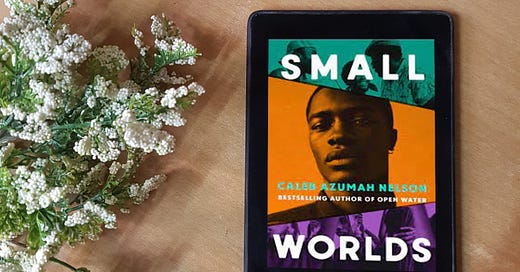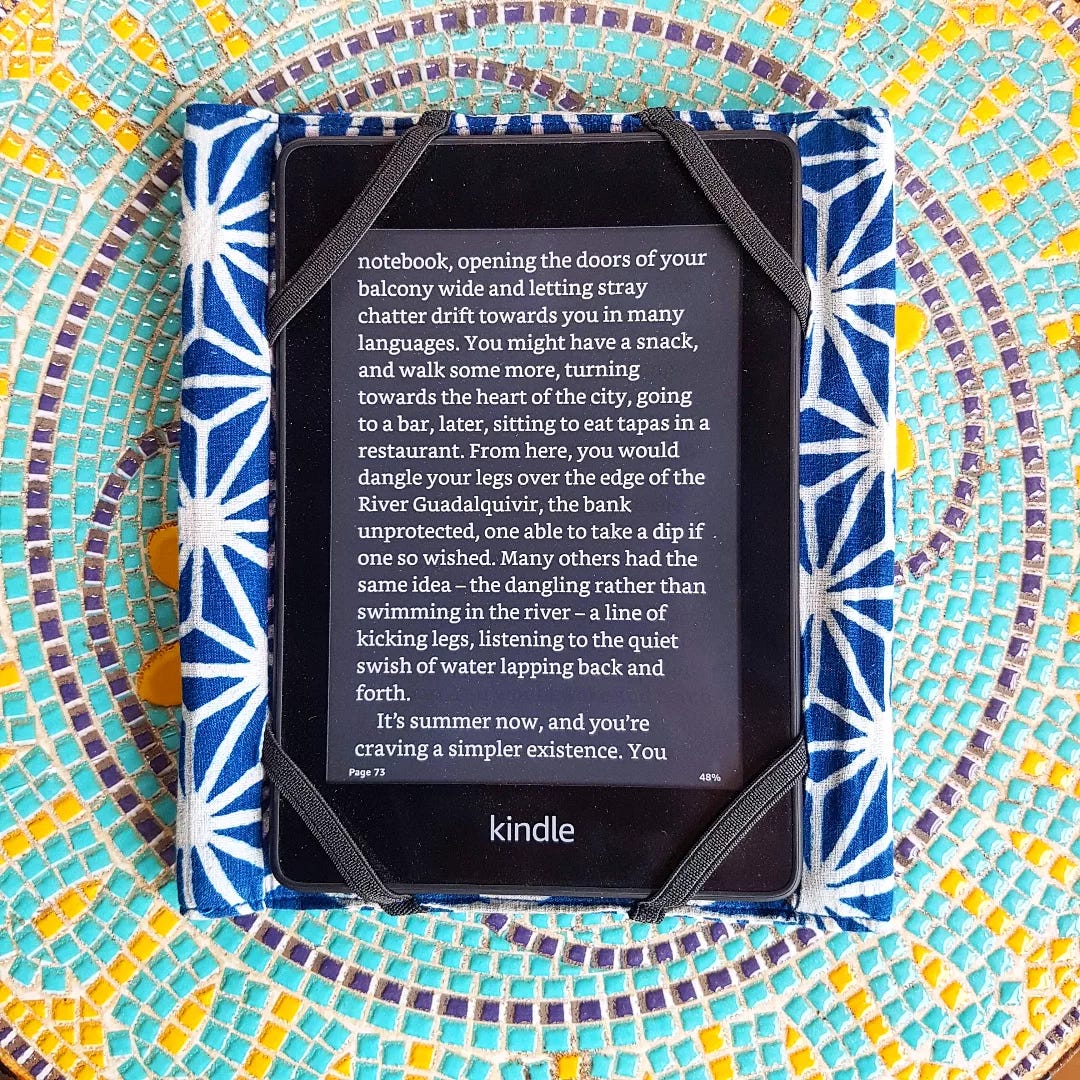Hi and welcome to the Storyteller! I can’t quite believe that it’s edition #20 already. Can’t thank all of you enough for showing up every Sunday with such enthusiasm for and interest in my words and recommendations. I am grateful to you, this growing community of readers, this found family of words and stories, if I may be extra emotional for a moment.
I have a double recommendation header in store for this special issue, so gather around and settle in!
Open Water
I discovered Caleb Azumah Nelson in early January 2022 when I picked up Open Water, his 2021 Costa-Book-Award-for-First-Novel-winning debut. The year before the book was born, the British-Ghanian writer and photographer lost his godfather, his aunt, and three of his grandparents.
I didn’t want to feel so hazy anymore. So I was spending a lot of the time at libraries, gallery spaces, cinemas, concerts, trying to go past the level of knowing, towards feeling, and asking where those feelings come from. That’s a question which is written throughout Open Water. How do you feel?—Penguin Features
In Open Water, a photographer and dancer meet at a South-East London pub. The blurb states: Both are Black British, both have won scholarships to private schools where they struggled to belong, both are now artists trying to make their mark in a city that by turns celebrates and rejects them. Tentatively, tenderly, they fall in love. But two people who seem destined to be together can still be torn apart by fear and violence.
You have always thought if you opened your mouth in open water you would drown, but if you didn't open your mouth you would suffocate. So here you are, drowning.
When I read this book, I was in a particular far-more-existential-than-usual state of mind, and shared below is what my personal reading experience was like.
When you read this book at a time that was only a month ago but now seems to bridge so much more, you didn't have the vantage point you do now, the ability to pinpoint why this novella that reads like a poem didn't quite creep into the expectant space created when you first stumbled upon it.
Now you know that though it has the lyrical rhythms and intensity of poetry, that beauty is both its strength and weakness.
You now know that the use of the second-person POV you adored in In The End It Was All About Love doesn't always work for a sustained narrative unless it has a clear sense of its internal direction and purpose. It doesn't work for a largely meandering narrative, for an acute detrimental distance from the protagonists who remain unknowable, with characteristics but without a lot of personality. It doesn't land the punches when it is simultaneously cinematic and all tell no show, when the language becomes repetitive, tries too hard to be profound.
For a novella of 150 pages, you are surprised at how heavy and dense the reading felt, slow despite its vivid movement. And yet the vignettes and the snapshots never achieve cohesion, despite some of the most piercing descriptions of being a Black man you've ever read, the struggles of one's 20s, and coming into our own.
You wonder if it's the kind of story you feel more than you understand—it is, after all, what you unconsciously did when the book lost you somewhere in the middle, let the melody wash over you.
Open Water defies a clear categorisation so maybe it stands to reason that you're similarly struggling to write about it, about your thoughts and experiences within its pages. Maybe you can just carry the amorphous sensations it made, and leave the rest behind. Nothing but Caleb Azumah Nelson's voice and the almost hypnotic feeling it throbs with at its best, hoping that future books by this promising talent leave a deeper, longer-lasting impression.
I got the chance to read the author’s second before it was published a few days ago on May 11, 2023, but more about that a short while later. Before, I want to share this quote from the same interview I’ve hyperlinked earlier from his publisher that somewhat vindicates my experience.
It is a joy to write but at times, quite heartbreaking. I guess, I’d love for readers not just to know what I’m saying, but to feel it too. The book is written in the second person so it’s very intimate, and in that way when a question is asked, I’m asking both myself and the reader. When I’m asking, How do you feel? That question comes both ways.
Small Worlds
It is not often that one gets a true second chance with an author. I’m grateful that Small Worlds was mine. Thank you to Grove Atlantic and Netgalley for the opportunity!
Two notes before we start.
Firstly, the author’s narrative style and approach to fiction, full of repetitions and modelled similar to jazz music (something as instinctual as it is planned out), is one that you’re either going to enjoy and allow grace for its flaws, or not like at all.
Secondly, music plays a pivotal role in both books—so much so that I want to go hunt for playlists if there aren’t any already!
Set over three defining summers in the protagonist Stephen’s life, Small Worlds has the same charm and pull as Open Water. For me, it’s actually the better, stronger story; you can see a clear upswing in the author’s structural and narrative assuredness. In comparison to the beautiful prose (smooth, poetic, with the uncanny knack of voicing complex feelings so many of us feel but are unable to sufficiently articulate), the characters and the plot do feel a little surface at times, but because this book has a much clearer narrative arc than its predecessor, it didn’t pull me out of the story as much as that did, especially in the second half.
Stephen is a second-generation British Ghanaian from South London, with roots and family in Accra, just like Nelson. He plays the trumpet and has only ever known himself in song—“between notes, in that place where language won’t suffice but the drums might, might speak for us, might speak for what is in our hearts”—and so is attempting to “build a church through music” to know himself.
Apart from his parents and his older brother Raymond, there is Adeline, his best friend who he’s in love with but unable to tell; Del who he has known for so long that he “knows the way light holds her neck, knows her rhythm even when she’s still”—“we’ve known each other so long I don’t know what name to give to this knowing.”
Small Worlds also uses the motif of dancing as something that will solve most of our problems, Stephen’s specifically. Whether in church where he goes dutifully every Sunday with his family, or during family/neighbourhood barbeques—“many of us gathered have long lost our faith but we believe in rhythm”—or in clubs and on curbs, and in the summer where something magical happens to time—“I wish we could always be this open, wish we might always feel some of this freedom.”
My verdict: highly recommended for readers that enjoy lyrical, exploratory coming-of-age stories about identity, belonging, home, father-son dynamics, immigrant life, racism, grief, love, and more.
About his debut, Nelson had said,
“I wanted to write something that read like music, that read like an album. But I also wanted to write something like a painting […] a novel about feelings and expressions.”
For Small Worlds, the idea was to “make it feel like one long, continuous song.”
Slice of life writing needs to balance immediacy with forward momentum; expansive storytelling with intimate vulnerability. The vibes in Small Worlds are immaculate, as in Open Water. While the former was more about the vastness of freedom, the latter feels more content in the small spaces we make for ourselves to love, to live, to dance, and to feel free.
“I gaze at my parents and see that a world can be two people occupying a space where they don’t have to explain. Where they can feel beautiful. Where they might feel free.”
“I’ve only known myself in song, in the space between the sounds we make to capture our quiet.”
What, who, would we be if we always had this kind of space?
As always, please feel free send in recommendations—books, movie, TV shows, authors to interview, ideas of what you’d like me to write on, rants/ramblings/excited monologues, GIFs and memes (especially them) and more. Just drop me a line and turn this into a conversation, even if just to say hi and let me know what you thought of the latest issue :) Or share this with someone you think might enjoy it.
Take care and see you next week!
Anu
If you really like the newsletter, please feel free to buy me a coffee: https://ko-fi.com/anushreenande
You can find me on Twitter at @AnuNande (follow for all the football chatter) and on Instagram at @booksinboston.






Lovely post, Anu! Tempted to pick up Small Worlds.
I may be wrong but from the excerpts you shared it seemed the writing is intended to impress, a calculated flamboyance which is meant to make you pause and say - ah, see how clever this is. I am reading Hamnet currently and have been mulling over this type of writing, which is glorious and beautiful and lyrical, but can sometimes feel a bit overwrought, a bit over-engineered? Would love to hear your thoughts on this!
Enjoyed going through the latest newsletter. Thank you for opening my mind to something more than mystery, humor, action and fantasy.